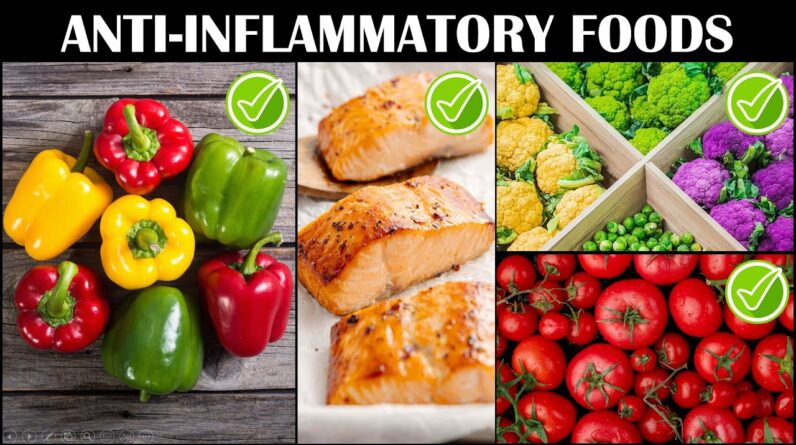
Looking to soothe your symptoms caused by inflammation? Look no further! In our latest article, aptly named “The Basics: Anti-Inflammatory Diet,” we delve into the world of eating habits and how they can help alleviate discomfort. If you’ve been dealing with a condition that triggers inflammation, it’s time to explore the power of dietary changes. From what to eat to what to avoid, we’ve got you covered. So, without further ado, let’s jump right into the wonderful realm of the anti-inflammatory diet. Get ready to discover a whole new way to support your health and well-being.

This image is property of i.ytimg.com.
What is an Anti-Inflammatory Diet?
Definition
An anti-inflammatory diet is a way of eating that focuses on reducing inflammation in the body. Inflammation is the body’s natural response to injury or infection, but chronic inflammation can lead to various health issues such as heart disease, arthritis, and even cancer. The goal of an anti-inflammatory diet is to help manage inflammation by incorporating foods that are known to have anti-inflammatory properties and avoiding foods that promote inflammation.
Principles
The principles of an anti-inflammatory diet involve consuming a variety of whole, unprocessed foods that are nutrient-dense and have been shown to reduce inflammation. These foods typically include fruits, vegetables, whole grains, lean proteins, and healthy fats. The diet also emphasizes reducing the consumption of processed foods, refined sugars, saturated fats, and trans fats, as these have been associated with increased inflammation in the body.
Benefits
Following an anti-inflammatory diet has been associated with numerous health benefits. Some of the potential benefits include reduced risk of chronic diseases such as heart disease and diabetes, improved joint health and reduced pain in arthritis patients, improved brain health and cognitive function, and enhanced immune function. Additionally, adopting an anti-inflammatory diet can contribute to weight loss and overall improved well-being.
Foods to Include in an Anti-Inflammatory Diet
List of Anti-inflammatory Foods
There is a wide variety of foods that have been shown to have anti-inflammatory properties and are beneficial to include in an anti-inflammatory diet. Some examples of these foods include:
- Fruits: Berries, apples, oranges, cherries
- Vegetables: Leafy greens, broccoli, bell peppers, tomatoes
- Whole Grains: Whole wheat, brown rice, quinoa, oats
- Healthy Fats: Olive oil, avocados, nuts, seeds
- Lean Proteins: Fish rich in omega-3 fatty acids, such as salmon and tuna, chicken breast, tofu
- Legumes: Beans, lentils, chickpeas
- Herbs and Spices: Turmeric, ginger, garlic, cinnamon
Examples of Healthy Anti-inflammatory Meal Plans
Creating a meal plan that incorporates anti-inflammatory foods can help individuals stay on track with their diet. Here are a few examples of healthy and balanced meal plans that focus on reducing inflammation:
- Breakfast: Oatmeal topped with berries and a handful of almonds
- Lunch: Grilled chicken breast with a side salad of mixed greens, cherry tomatoes, and avocado
- Snack: Carrot sticks with hummus
- Dinner: Baked salmon with roasted sweet potatoes and steamed broccoli
- Dessert: Greek yogurt with a drizzle of honey and a sprinkle of cinnamon
In each meal plan, it is important to include a variety of anti-inflammatory foods to ensure you are getting a range of beneficial nutrients.
Foods to Avoid in an Anti-Inflammatory Diet
List of Inflammatory Foods
In an anti-inflammatory diet, it is advised to limit or avoid foods that are known to promote inflammation. These include:
- Processed Foods: Packaged snacks, fast food, sugary cereals
- Refined Sugars: Soda, candy, pastries, cookies
- Saturated and Trans Fats: Fried foods, fatty cuts of meat, full-fat dairy products
- Artificial Additives: Artificial sweeteners, food colorings, preservatives
- High-Lactose Dairy: Milk, ice cream, soft cheeses
- Alcohol: Beer, wine, spirits
Common Culprits of Inflammation
Certain foods have been identified as common culprits of inflammation in some individuals. It is important to note that these foods may affect each person differently, and it’s essential to pay attention to your body’s individual response. Some common culprits of inflammation include:
- Gluten: Found in wheat, barley, and rye
- Nightshade Vegetables: Tomatoes, potatoes, eggplants, peppers
- High-Sodium Foods: Processed meats, canned soups, and sauces
- Added Sugars: Sweetened beverages, processed snacks
- Vegetable Oils: Soybean oil, corn oil, canola oil
By avoiding or limiting these foods, individuals may experience a reduction in inflammation and related symptoms.
Key Nutrients and Supplements for an Anti-Inflammatory Diet
Omega-3 Fatty Acids
Omega-3 fatty acids are a type of polyunsaturated fat that has been recognized for its anti-inflammatory properties. Including omega-3-rich foods in your diet, such as fatty fish like salmon, mackerel, and sardines, or plant-based sources like flaxseeds, chia seeds, and walnuts, can contribute to reducing inflammation in the body. Omega-3 supplements, such as fish oil or algae oil capsules, can also be beneficial for individuals who struggle to consume enough through their diet.
Vitamin D
Vitamin D plays a crucial role in modulating the immune system and reducing inflammation. Spending time in the sun and consuming vitamin D-rich foods like fatty fish, fortified dairy products, and egg yolks can help maintain optimal vitamin D levels. In some cases, a healthcare professional may recommend vitamin D supplements.
Turmeric and Curcumin
Turmeric contains a potent compound called curcumin, which has been extensively studied for its anti-inflammatory effects. Incorporating turmeric into meals or taking curcumin supplements may help reduce inflammation. However, it is important to note that the absorption of curcumin is enhanced when combined with piperine, a compound found in black pepper.
Ginger
Ginger has been used for centuries for its medicinal properties, including its anti-inflammatory effects. Ginger can be added to meals, brewed into tea, or taken as a supplement. It is believed to work by inhibiting the production of inflammatory chemicals in the body.
Probiotics
Probiotics are beneficial bacteria that can help restore the balance of gut bacteria, which plays a crucial role in immune function and inflammation. Foods rich in probiotics include yogurt, kefir, sauerkraut, and kimchi. Alternatively, probiotic supplements are available for those who may not consume enough probiotic-rich foods.
Green Tea
Green tea contains antioxidants called catechins, which have been shown to have anti-inflammatory effects. Drinking green tea regularly may help reduce inflammation in the body. Additionally, green tea also contains compounds that can promote relaxation and reduce stress, which is beneficial for overall health and inflammation management.
Tips for Implementing an Anti-Inflammatory Diet
Gradual Changes
Implementing dietary changes gradually can help individuals adjust to the new way of eating and make it more sustainable in the long run. Start by making small adjustments, such as incorporating more fruits and vegetables into your meals or swapping unhealthy snacks for healthier alternatives. Gradually increase your intake of anti-inflammatory foods while reducing the consumption of inflammatory foods.
Meal Planning and Preparation
Planning and preparing meals in advance can help individuals stick to their anti-inflammatory diet. Spend some time each week creating a meal plan and grocery list. By having healthy meals and snacks readily available, it becomes easier to make nutritious choices and avoid reaching for unhealthy options.
Reading Food Labels
Reading food labels is crucial when following an anti-inflammatory diet. Look for foods that are low in added sugars, sodium, and unhealthy fats. Additionally, be mindful of any potential allergens or food additives that may trigger inflammation or sensitivities. Familiarize yourself with ingredient lists and aim for whole, unprocessed foods whenever possible.
Eating Mindfully
Practicing mindfulness while eating can enhance the benefits of an anti-inflammatory diet. Take the time to savor and appreciate each bite, focusing on the flavors, textures, and satisfaction provided by the food. Eating slowly and paying attention to hunger and fullness cues can help prevent overeating and promote better digestion.
Stress Reduction
Stress is known to contribute to inflammation in the body. Alongside dietary changes, incorporating stress reduction techniques such as exercise, meditation, deep breathing exercises, and sufficient sleep can support the overall effectiveness of an anti-inflammatory diet.
Potential Challenges and Solutions
Social Situations and Dining Out
Navigating social situations and dining out can be challenging when following an anti-inflammatory diet. It can be helpful to inform friends and family about your dietary preferences beforehand and offer to bring a dish that aligns with your needs. When dining out, choose restaurants that offer healthier options and be clear about your dietary restrictions to the waitstaff. It may also be beneficial to review the menu ahead of time and ask questions about ingredient preparation.
Managing Cravings
Cravings for unhealthy, inflammatory foods can arise when following an anti-inflammatory diet. It may be helpful to find healthier alternatives to satisfy those cravings, such as homemade baked goods using whole grain flours and natural sweeteners, or opt for dark chocolate, which has anti-inflammatory properties. Additionally, incorporating spices like cinnamon or turmeric into meals can provide a satisfying flavor profile without compromising the anti-inflammatory aspect of the diet.
Budgeting and Affordability of Anti-inflammatory Foods
Some individuals may find that the cost of anti-inflammatory foods is higher compared to less nutritious options. To overcome this challenge, it can be helpful to plan meals around seasonal produce, buy in bulk, and consider frozen fruits and vegetables as cost-effective alternatives. Additionally, shopping at local farmers’ markets or joining a community-supported agriculture program can provide access to fresh, affordable produce.
Scientific Evidence behind Anti-Inflammatory Diets
Research Studies and Findings
Numerous research studies have explored the effects of an anti-inflammatory diet on various health conditions. For example, a study published in the American Journal of Clinical Nutrition found that following an anti-inflammatory diet was associated with a reduced risk of cardiovascular disease. Other studies have shown that an anti-inflammatory diet can improve symptoms in individuals with rheumatoid arthritis and reduce the risk of developing type 2 diabetes.
Effectiveness for Various Health Conditions
While an anti-inflammatory diet is not a cure for any specific health condition, it has been shown to have potential benefits for various conditions characterized by inflammation. Some of these conditions include heart disease, arthritis, inflammatory bowel disease, asthma, and even certain types of cancer. It is worth noting that the effectiveness of the diet may vary based on an individual’s specific circumstances, and consulting with a healthcare professional is advised for personalized guidance.
Precautions and Considerations
Consulting a Healthcare Professional
Before making significant changes to your diet or starting an anti-inflammatory diet, it is important to consult with a healthcare professional, particularly if you have any underlying health conditions or take medications. A healthcare professional can assess your individual needs and provide guidance on how to safely incorporate an anti-inflammatory diet into your lifestyle.
Avoiding Excessive Restriction
While an anti-inflammatory diet promotes the consumption of nutrient-rich foods, it is essential to avoid excessive restriction. Ensuring a balanced intake of macronutrients (carbohydrates, proteins, and fats) and meeting all nutritional needs is crucial for overall health and well-being. Instead of focusing solely on restriction, the emphasis should be on incorporating a wide variety of anti-inflammatory foods.
Addressing Underlying Health Issues
An anti-inflammatory diet can be a helpful addition to an overall healthy lifestyle, but it is not a replacement for medical treatment. If you have an underlying health condition that causes inflammation, it is important to continue working with your healthcare professional to address the root causes and manage your condition effectively.
Success Stories and Testimonials
Personal Experiences
Many individuals have shared their success stories and testimonials about following an anti-inflammatory diet. They often report improved energy levels, relief from chronic pain and inflammation, better digestion, and overall improved well-being. While these experiences can be inspiring, it’s important to remember that each individual’s journey is unique, and results may vary.
Transformations and Improved Health
Some individuals have experienced impressive transformations and improved health outcomes by adopting an anti-inflammatory diet. Weight loss, improved blood sugar control, reduced symptoms of autoimmune diseases, and improved mood are among the many positive changes that individuals have reported. These stories serve as motivation and encouragement for others who are considering incorporating an anti-inflammatory diet into their lifestyle.
Conclusion
An anti-inflammatory diet offers a holistic approach to managing inflammation in the body by focusing on consuming nutrient-rich foods and avoiding inflammatory triggers. By incorporating a wide variety of anti-inflammatory foods, individuals may experience reduced inflammation, improved overall health, and a decreased risk of chronic diseases. It is essential to remember that while an anti-inflammatory diet can be beneficial, it is not a one-size-fits-all solution, and it is important to tailor the diet to one’s individual needs and work closely with a healthcare professional for personalized guidance. By following the principles of an anti-inflammatory diet, individuals can take an active role in optimizing their health and well-being.






